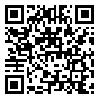BibTeX | RIS | EndNote | Medlars | ProCite | Reference Manager | RefWorks
Send citation to:
URL: http://ijdld.tums.ac.ir/article-1-5268-en.html
2- Research center for Advanced medical Technologies, Electrical Engineering Faculty, Hakim Sabzevari University, Sabzevar, Iran
3- Biochemistry Section, Department of Biology, Faculty of Basic Science, Hakim Sabzevari University, Sabzevar, Iran
4- Healthy ageing Research Center, University of Medical Sciences, Sabzevar, Iran
Background: Diabetes is such diseases that need high quality beside prevention such as correctly predict fluctuations in blood glucose levels. The main complications of the disease can be anesthesia, coma and even death. Today, in these patients, the correct dose of insulin determined based on experience or doctors knowledge, and interact between the patients and physician, although there is an inevitable human errors.
Methods: In this study based on applied method, 124 patients and 188 healthy subjects based on 12 features by Random Selection, Who had been referred to Research Center for Diabetic in Sabzevar university of Medical Science since 2006 to 2011 were studied. The proposed system has several subsystems, such as evolutionary algorithms (BPS 1) to select the most effective features, Data Mining Algorithms (SVM 2) to detect and classify the features from the non-effective features. Adaptive Neuro fuzzy systems (ANFIS 3) to estimate learn and adaptation in order to correctly predict have been used.
Results: In this study, we try to use artificial intelligence systems to determine the correct dose of insulin for diabetics. The proposed system combines the best attributes in the database in the form the interaction was able to achieve high accuracy with the lowest error. The proposed system based on best features in the database in the interaction form was able to achieve high accuracy with the lowest error. The proposed system in the form of composition and interaction with the subsystem was able to achieve carefully 84.1% in specificity, 91% in sensitivity and 92.9% in accuracy.
Conclusion: In this research, due to the importance of correct and timely determination of insulin for diabetics, a new method based on the combination of intelligent systems is presented. Thus, the results obtained in previous articles and studies provide significantly improved.
Received: 2014/11/17 | Accepted: 2015/02/25 | Published: 2015/12/14
| Rights and permissions | |
 |
This work is licensed under a Creative Commons Attribution-NonCommercial 4.0 International License. |





